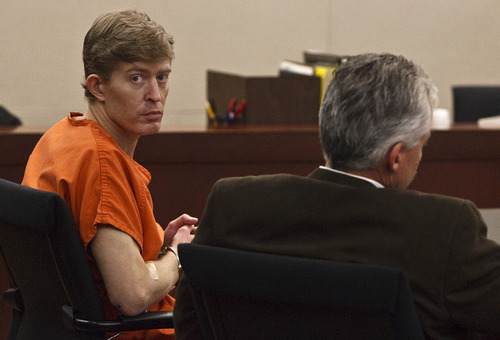This is an archived article that was published on sltrib.com in 2012, and information in the article may be outdated. It is provided only for personal research purposes and may not be reprinted.
Using information she learned firsthand from another case, a lawyer representing Ogden shootout suspect Matthew David Stewart is seeking to remove the judge overseeing Stewart's property forfeiture case.
Second District Court Judge Mark DeCaria was "emotionally distraught" over the death of Weber Morgan Narcotics Strike Force Agent Jared Francom, according to the request from Stewart's lawyer, Emily Swenson. Stewart is accused of killing Francom in the Jan. 4 shootout that also injured Stewart and five other officers.
Hours before his death, Francom testified in a trial before DeCaria, Swenson wrote in her motion. She was an attorney in the case.
The day after the shooting, with the trial still underway, DeCaria held a meeting in his chambers with attorneys.
"During this meeting, [Swenson] witnessed Judge Decaria (sic) emotionally distraught over the events that had occurred the night before and the passing of Agent Jared Francom," Swenson wrote.
DeCaria was the Weber County attorney before taking the bench in 2009. Swenson's motion contends that while DeCaria was the Weber County attorney, he worked "closely" with Francom.
"The positive relationship between Judge Mark R. Decaria and the deceased Agent Jared Francom is potentially prejudicial to [Stewart] in several respects," Swenson wrote, "including, but not limited to, the fact that Honorable Judge Decaria is emotionally and personally involved in this case and was extremely upset over the events leading up to this death."
DeCaria is hearing the case that will resolve whether Weber County can seize Stewart's home at 3268 Jackson Ave. in Ogden, and Swenson represents Stewart in that dispute.
Police and prosecutors allege Stewart was growing marijuana in the home and were serving a search warrant there when the shooting began. Another judge and other lawyers are handling Stewart's criminal case, where he is charged with capital murder and eight other felonies.
A 2004 article in the Utah Bar Journal says judges are to recuse themselves "in a proceeding in which the judge's impartiality might reasonably be questioned." But the article goes on to list a string of Utah Supreme Court decisions that offer a complex view of the issue.
The Supreme Court has sided with trial judges who stayed on cases in which family members worked for one of the parties or the judges knew one of the parties. The justices have also said on occasion a trial judge should have recused himself or herself due to an appearance of conflict but denied the appeal because there was no proof the judge's rulings at trial were biased.
Twitter: @natecarlisle



